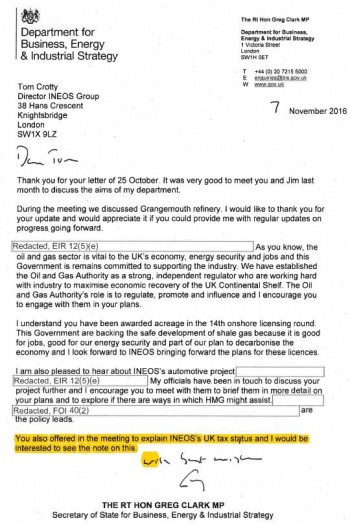Tom Crotty

|
This article is part of the Spinwatch Fracking Portal and project |
Tom Crotty is the external affairs director of Ineos UK, previously chief executive officer of INEOS Olefins & Polymers Europe.
Contents
Views
Fracking is not a Frankenstein monster
In July 2016 Ineos announced it intended to accelerate UK shale gas development by lodging as many as 30 planning applications to drill test fracking wells in the north of England in early 2017. It said it hoped to begin extracting gas within 18 months.
Crotty said he believed that once drilling started, people would 'see [fracking] is not the Frankenstein monster they thought it was'. According to the Financial Times, 'he was confident that recent changes to rules allowing ministers to intervene if local councils delay granting permission would finally lead to Ineos drilling test wells'. Until permission was granted, he admitted it 'would continue to be “difficult” to convince critics'. [1]
Injunction
The potential of UK shale gas for the chemicals industry
In 2013 Crotty gave evidence to the House of Commons Energy and Climate Change Committee about his company's views on the potential for shale gas development":
- ...on the quality issue, from a chemicals point of view, clearly, we like to see gas that is not just pure methane. It is the non-methane elements that are of value to us: it is the ethane and the propane. For example, in the US those elements are fractionated out and we can use them as raw materials to build chemicals with. We are hopeful that the UK shale deposits would allow us to do the same. As an industry in the UK, the problem we have at the moment is that the quantity of ethane coming out of the North Sea supply has declined dramatically in the last 10 to 15 years to the point where it is almost non-existent now. Therefore, getting a new localised supply would be a massive potential benefit.[2]
Impact on gas prices?
In January 2013 Crotty responded to a question from the UK House of Commons Energy and Climate Change Committee about how shale gas might affect how gas is traded either globally or regionally and 'whether it might restrict the extent to which prices might otherwise rise in the European market?':
- from our end we are obviously energy-intensive users. It is very difficult to know the degree of impact. Our view is there must be an improvement in liquidity. We would hope that improvement in liquidity would improve energy prices, but there is no guarantee of that. I suspect it will not be anything like as dramatic as we have seen in the US, because that is very much a liquids - driven issue. That is chasing oil with associated gas. But I think it will improve liquidity and, therefore, it should improve the market for large users like us.
- My personal view is, yes. That is our biggest worry. But if you look at what is happening in the European market today, prices are rising inexorably. For producers of chemicals or steel, we find ourselves in an increasingly uncompetitive position as a result of those prices. Something needs to happen to address that. We would hope that, at a minimum, it would stop that further rise. I should say, from a chemicals point of view, we must not forget the other aspect of shale gas, which is potentially a key raw material for the chemicals industry, not from its energy content but from its chemical content. That has probably been the most transformational impact of it on the US chemical industry. [2]
Meetings with ministers
2016
In October 2016 Crotty and his boss Jim Ratcliffe met with the UK secretary of state for business and energy Greg Clark. Clark wrote a follow-up letter, asking Crotty to further explain Ineos' tax status in the UK.

Affiliations
Resources
Notes
- ↑ Peggy Hollinger, Industry Editor Ineos targets British test wells to kick-start shale gas market, Financial Times, 17 July 2016, accessed same day
- ↑ 2.0 2.1 HOUSE OF COMMONS Oral Evidence Taken before the Energy and Climate Change Committee on Wednesday 16 January 2013 THE IMPACT OF SHALE GAS ON ENERGY MARKETS, WEDNESDAY 16 JANUARY 2013, PAUL SPENCE, TOM CROTTY, MARTIN PIBWORTH and PETER PARSONS, JOHN HAYES MP, SIMON TOOLE and CHRIS BARTON, Evidence heard in Public, Questions 219-340